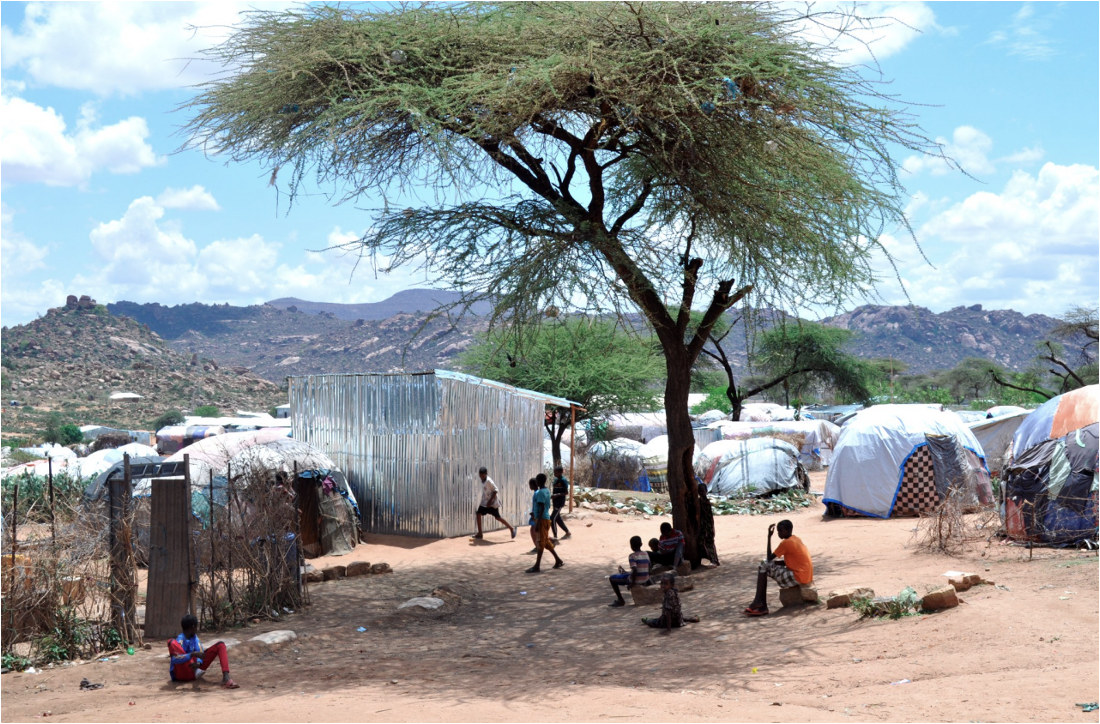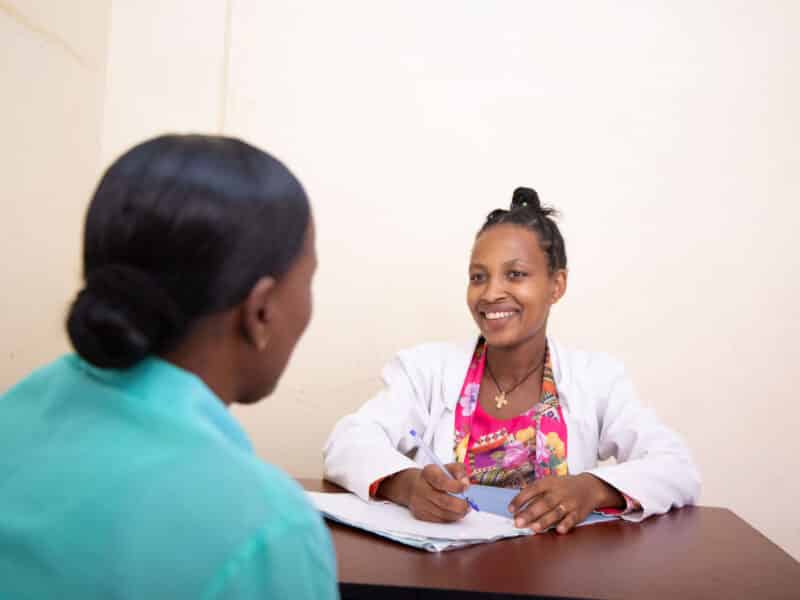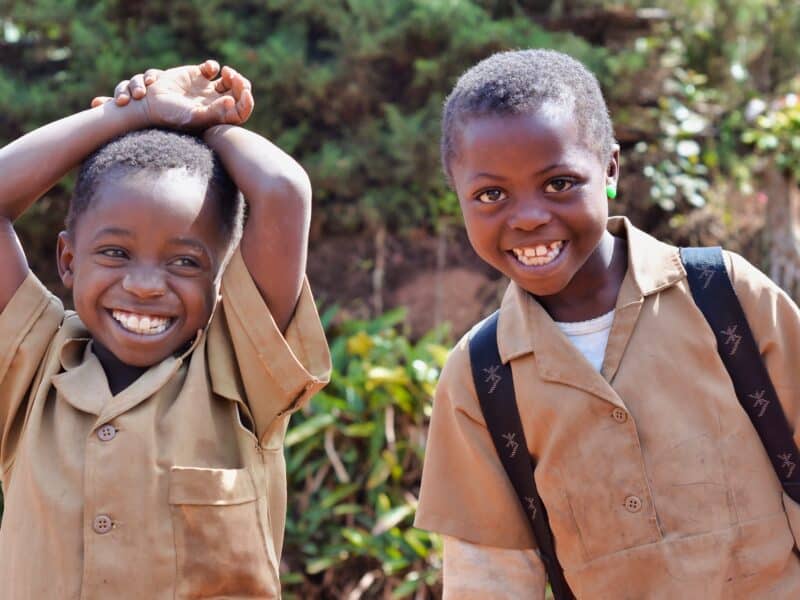How do you get people to pay attention to lessons on COVID-19 prevention when they barely have enough food to eat or basic medical care?
Such was the challenge of the Johns Hopkins Center for Communication Programs in Ethiopia, where because of conflict – as well as climatic shocks such as drought and floods – there were more than 1.7 million internally displaced persons (IDPs) across the nation as of April 2021. The U.S. Agency for International Development in late June estimated 900,000 Ethiopians are facing famine conditions.
From July 2020 to April 2021, the CCP-led Breakthrough ACTION project, with support from USAID’s Bureau of Humanitarian Assistance, worked to train volunteers living in IDP sites to bring awareness about COVID-19 and gender-based violence to the communities living there. CCP staff quickly learned that the people living in these IDP sites were struggling with their basic needs and, at first, they were uninterested in what CCP had to say about anything beyond that.
“The stories that we heard were very traumatizing,” says CCP’s Tegbar Achamyeleh, a project manager in Ethiopia. “After some time, we acknowledged they had broken hearts due to conflicts, but we were able to convince them they could still give back to their communities.”
In order to see how they could help, CCP’s team in Ethiopia conducted exploratory visits to some of the sites. They found a lack of concern about COVID-19 and found that gender-based social norms created dangerous situations for many women. There was a glaring lack of services and supplies, and a huge gap in awareness around gender-based violence among IDP communities.
The project developed community engagement tools on infection prevention and control of COVID-19, and on reducing gender-based violence. CCP developed “cue cards” to help volunteers guide their fellow IDPs through these lessons, which were translated into three local languages, Amharic, Afaan Oromo and Somali.
More than 180 trained volunteers at 10 IDP sites conducted various community engagement activities including house-to-house visits and facilitating community discussions at locations such as marketplaces, food distribution sites and religious institutions. Trained volunteers reached an estimated 71,000 people with key COVID-19 prevention and gender-based violence messages.
The situation at the Chagni Ranch IDP site in the Amhara region was dire before CCP arrived. “There were many IDPs facing serious health issues and had been admitted to the hospital,” says Ayana, who was trained to help his fellow IDPs. “Each of us had recent painful memories, having lost our beloved family members during a brutal rebel group attack in Metekel. We were desperate and in darkness. Especially during the first few weeks, there was no toilet, no adequate number of tents, and no food supplies in this area. …
“The problem was more serious for women and girls, who faced harassment while traveling far from their tents to defecate. More than 100 people lived in a single tent. With women and men living together, it was very difficult to protect women and girls from sexual harassment.”
He became a volunteer to spread key messages about ways to prevent COVID-19 and gender-based violence. He described the many questions asked during the training, including about pressing basic unmet needs (food and shelter). “Some of us were crying and unable to fully attend the [first few sessions of the] training,” he recalls. “But, over time, the training sessions diverted our thinking. We decided to be part of the solution.”
It’s not easy to provide IDPs with the best information, when they have so much else on their minds.
“Some IDPs are resistant to hearing about COVID-19,” Ayana says. “We, of course, understand the reason: we are telling them to keep two meters of distance from other people, and yet more than 100 IDPs live in a single tent. How can one keep two meters of distancing while living in congestion that doesn’t even allow two centimeters of space from other people? But we know our effort has created a high level of awareness on COVID-19 and gender-based violence among IDPs.”
The community discussions helped IDPs to come up with short-term solutions for common issues such as sanitation. The community took corrective measures, including designating separate sleeping tents for men and women and a specific location for defecation far from the residences, which enables others to look out for their safety as they travel there. In the meantime, working with organizations such as UNICEF, they worked to construct toilets and bathrooms, and with the International Organization for Migration, they helped to build better tents that slept fewer people (80 per tent). Volunteers took the responsibility of cleaning toilets on a daily basis. “Now we all feel proud of what we are contributing to our community,” he says.
CCP’s Simon Heliso, chief of party in Ethiopia, says he believes that the IDP work was ultimately successful because his team took the time to understand all the challenges on the ground that IDPs were facing – not just the issues related to COVID-19 and gender-based violence that they were charged with reducing.
“We believed people wanted to change, but the conditions they were living under made some of the COVID-19 prevention behaviors difficult,” Heliso says.
“We also learned that until basic needs are met, such as food and shelter, people aren’t in a place to talk about issues such as COVID-19 and gender-based violence, even though they are very important as well. We were able to convince people that their long-term and potentially devastating challenges should not be overlooked in trying to focus on immediate short-term needs. In so doing, the project was also able to bring the pressing community needs to other partners who could support with provision of basic supplies.”





